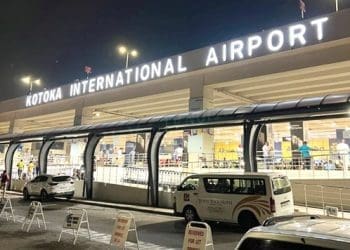A national health crisis is unfolding as the full-scale strike by the Ghana Registered Nurses and Midwives Association (GRNMA) cripples government-run health facilities as patients have been abandoned at the various hospitals.
Outpatient Departments (OPDs), emergency units, anaesthesia clinics, consulting rooms, and pain management centres, among others, have all shut their doors to the public, following the complete withdrawal of services by nurses and midwives.
Patients across the country are bearing the brunt of the standoff, left stranded and in distress without medical assistance.
Many hospitals have scaled down operations drastically, attending only to emergency cases and already-admitted patients, and even those are being handled by a skeletal staff under immense pressure.
The strike by the health professionals is having a toll effect as patients have been abandoned at the various hospitals across the country.
Desperate patients left to fend for themselves
The shutdown has turned once-busy OPDs, consulting rooms, wards, and emergency units into ghost towns.
The usual scenes of patients—some clutching babies, others elderly and frail—waiting for hours in stiff chairs for a chance to be seen have now given way to shuttered entrances and eerie silence.
This crisis is acutely affecting the poorest and most vulnerable Ghanaians—those who cannot afford the high costs of private healthcare.
Without public sector nurses and midwives, who are the backbone of Ghana’s healthcare delivery, entire communities have been cut off from essential medical services.
From consultation to delivery: A system in collapse
The effects of the strike are systemic.
Immunisation drives, child health services, maternal care, and community outreach programmes have come to a halt.
In maternity wards, the situation is even more dire.

With midwives absent, doctors and non-specialist staff have taken on the daunting task of managing deliveries.
Doctors themselves are overwhelmed.
In emergency cases, many are now performing duties typically assigned to nurses, such as recording patient vitals and basic monitoring.
A national emergency, not just a labour dispute
What began as a labour dispute has evolved into a national emergency.
Every day lost, every patient unattended, and every ward unmanned adds to the human cost of the crisis.
Ghana is not just battling disease—it is confronting the consequences of institutional neglect.
The Association has reiterated that nurses and midwives have been pushed to the wall, citing a lack of good faith on the government’s part in implementing a Collective Agreement signed in May 2024.
According to GRNMA, the Ministries of Finance and Health have failed to fulfill their commitments despite numerous reminders and dialogue attempts.
GRNMA defends strike
The Association insists the strike is lawful, necessary, and in the best interest of patients.
The core demand is the urgent implementation of the Collective Agreement, which addresses improved remuneration, safer working conditions, and adequate staffing levels.

Without a swift resolution, GRNMA warns that it may escalate the action to include the full withdrawal of emergency services.
Lives at stake, trust on the brink
The longer the strike continues, the greater the risk of preventable deaths and irreversible damage to public health. Ghana’s healthcare infrastructure, already fragile, teeters on the brink of collapse.
Where are the sick getting help?
The empty OPD, wards, and consulting rooms of @KBTH_GH as a result of the nurses’ strike@KMAkandoh @MoHGhana @officialghsn pic.twitter.com/ynAfP7y2Vt— Newscenta (@newscenta_gh) June 9, 2025
For a country that has long relied on its nurses and midwives as frontline defenders of public health, the absence of these professionals is devastating.
Public support for the nurses remains strong, but patience is wearing thin.
Time to act: Before it’s too late
The strike is a clarion call not just to the government but to society at large.
Ghana must choose: ignore the pleas of its caregivers and watch the system collapse—or listen, engage, and act to restore dignity to the very people who sustain its health services.
Health is a human right, not a political bargaining chip.
The cost of inaction is not just policy failure but human lives lost—quietly, painfully, and needlessly.
The nurses are not on strike for privilege.
They are on strike for the tools to save others—and perhaps themselves.














